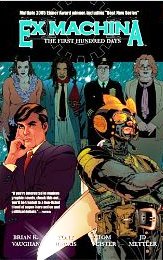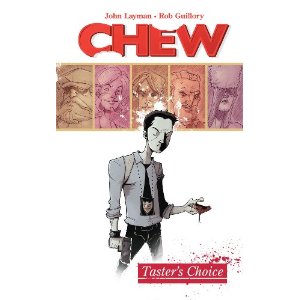Ex Machina Vol. 1 – The First Hundred Days
July 19th, 2010
Writer & Artist: Brian K. Vaughan and Tony Harris
Reviewer: Aaron
Ex Machina doesn’t look or feel quite like any other comic out there. Sure, there are a number of comics that combine the superhero genre with realpolitik, some that look at superheroes in the ‘real’ (i.e. our) world and there are some that have looked at the fallout from 9/11, but none have gone as far as Ex Machina in combining all of these elements in as grounded and intelligent a manner.
Ex Machina is the story of Mitchell Hundred, the Mayor of New York after Rudolph Giuliani, a man swept into power on the back of his former days as a super-powered vigilante, ‘The Great Machine’. His particular power is the ability to hear, communicate with, and control any and all complex electronic devices. On September 11th 2001 he used this power to prevent one of the hijacked planes from crashing into the second World Trade Centre Tower. He was too late to stop the first plane, a fact that haunts Hundred, and the entire series, from the outset.
The first issue starts with a definition of ‘deus ex machina’ and an image of a costumed individual flying towards a plane. The next page reveals that this is a photograph of ‘The Great Machine’ on 9/11, an image that Mitchell Hundred describes himself as being ‘sick of’. The set-up of the series is then revealed when Hundred describes what follows as ‘ the story of my four years in office, from the beginning of 2002 through godforsaken 2005’.
From here on in we skip between several distinct time frames, a device used repeatedly through the series, travelling between Hundred’s childhood in the 1970’s, the origin of his powers in 1999, his period as ‘The Great Machine’ in 2000-2001 and the start of his tenure as Mayor of New York City. Along the way we are introduced to many of the main characters in the series, including Bradbury (Hundred’s friend and bodyguard), Kremlin (the man behind The Great Machine’s costume and weaponry), Martha Hundred (Hundred’s mother), Deputy Mayor Wylie, Journal Moore (a young aide in Hundred’s office), Police Commissioner Angotti and Suzanne Padilla (his Chief of Staff) amongst others.
We see the key moments in Hundred’s relationships with these characters as he, and they, are forced to deal with a number of different events, from the relatively banal (a young artist’s attempt to be edgy by creating a controversial image of Abraham Lincolm using public funds, debates over a smoking ban) to the worrying (a killer targeting city employees, an assassination attempt) to the type of thing many would consider typical comic fare (the violent origin of Mitchell Hundred’s powers and his decision to use them). In each case Vaughan is able to keep the narrative focused, revealing important information about the characters and the world they inhabit through dialogue exchanges that though wordy are never verbose nor overwhelming to the reader.
The author also reveals a deep and impressive knowledge of New York political lore as well as a grasp of the minutiae of the day-to-day running of a city the size of New York. Arguments between the characters are often the highlight of a chapter as the author dissects a topic that could have been ripped directly from the paper he read the morning he sat down to write, providing different points of view (few subjects are portrayed as only one character sees them) and the differing problems presented to politicians, trying to keeps all the gears working whilst not alienating vast sections of the electorate.
Using conversation as the main means of imparting this information also plays to the strengths of penciller Tony Harris, whose style of using photo reference can look awkward when dealing with a lot of action but which works brilliantly in bringing out the facial expressions of characters when conversing (or for that matter arguing, screaming or swearing at each other). Underscored by the brilliant colouring job and inks, the art style beautifully underscores the understated, realistic style of Vaughan’s writing.
That’s not to say that ‘The First Hundred Days’ is the perfect introduction to the series. For the first couple of issues the author’s juggling of different timeframes can be slightly disorientating, though they do become clearer as the series progresses and each timeframe’s events influence or follow on from one another. The introduction of so many characters and events can also leave audiences feeling a little out of their depth initially, but it all adds to the richness of the series as it progresses.
Ex Machina was one the most interesting series being put out over the last few years, and along with other titles such as ‘Y The Last Man; and ‘Pride of Baghdad’ has launched Brian K Vaughan firmly into the A-List of comic book writers working today. In Ex Machina Tony Harris found the perfect match for his unique looking pencils as well as to the many ideas he contributed towards the final form of the series, a collaborative match he will be hard pressed to find again. Whether you’re a political animal, a superhero fan or just someone who enjoys a tightly written story, this one is most definitely worth your time.
Paperback: 136 pages
Publisher: Wildstorm (26 Jun 2007)
ISBN-10: 1401206123

